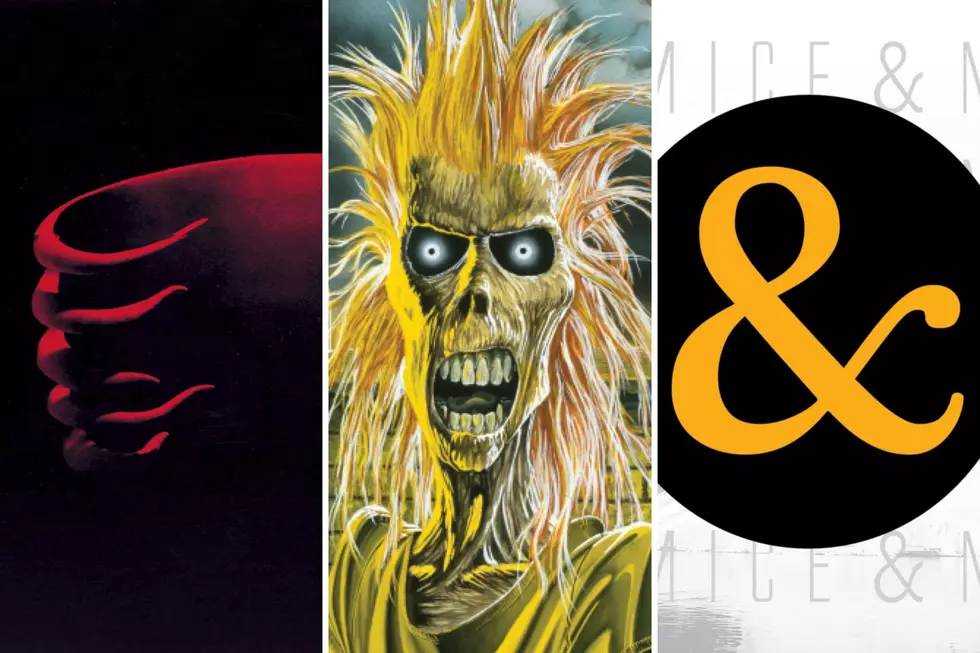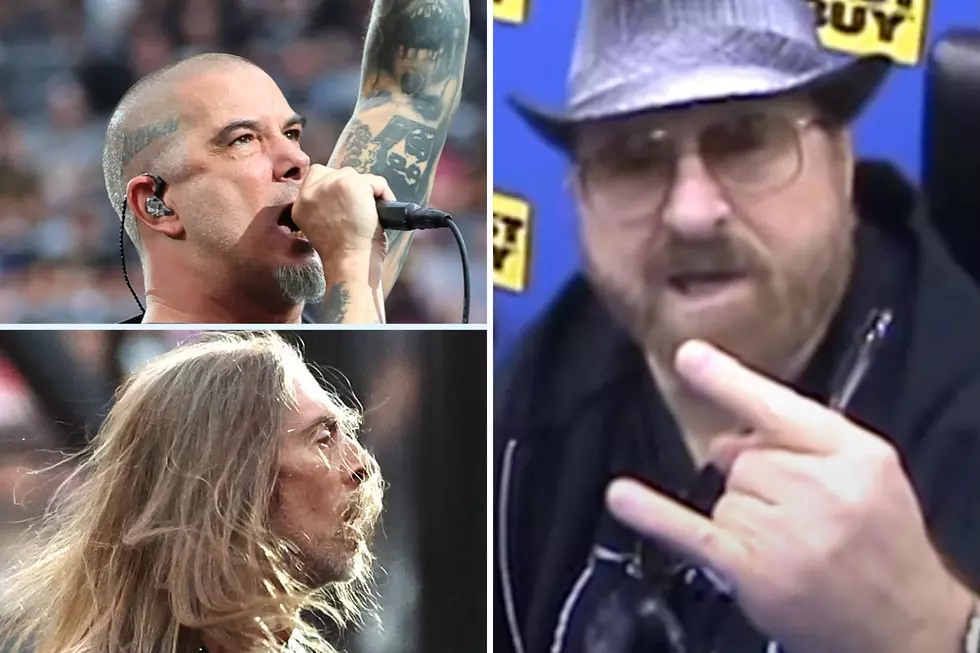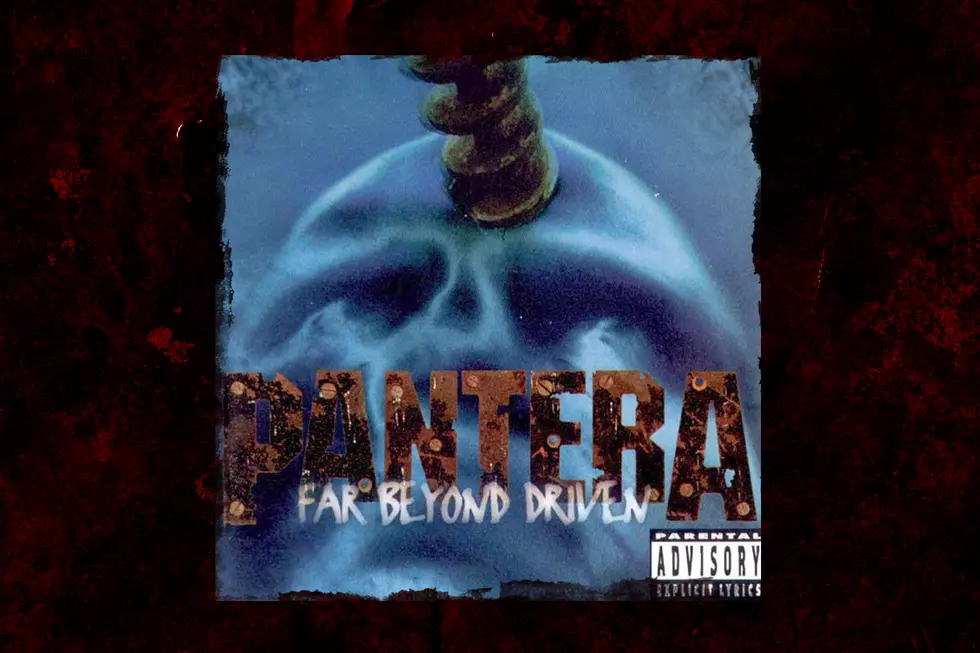
Remembering Vinnie Paul: The Drummer and the Man
Every night before Damageplan brothers Vinnie Paul Abbott and his brother "Dimebag" Darrell Abbott went onstage, they high-fived and said, “Van Halen!” It was more than a good luck ritual. It was an acknowledgment of their roots.
Paul, who died at 54, is best known for his years in Pantera, one of the heaviest, most aggressive metal bands of all time. But unlike many of their peers, Pantera didn’t come from a thrash metal background. They had a vocalist bred on hardcore, their guitar passages were sharper than razors and their rhythms were positively pummeling. Yet at the core, Vinnie Paul’s playing was as rooted in Van Halen and KISS as in Metallica and Slayer. It’s a large part of what made Pantera such an explosive group.
The double-bass drumming on Van Halen’s “Hot for Teacher” and the flair with which Alex Van Halen and KISS’ Peter Chris played accents and fills had a major impact on Vinnie Paul. And while Paul was into Keith Moon-style acrobatics, he played with as much precision as groove. Along with bassist Rex Brown, he held down the rhythm, allowing Dimebag to burst into a pyrotechnic solo without missing a beat.
Paul’s explosive and unrelenting drumming style has had a broad impact on contemporary metal drummers, including Lamb of God’s Chris Adler, Five Finger Death Punch's Jeremy Spencer and the late Avenged Sevenfold drummer Jimmy “The Rev” Sullivan, all of whom have praised both Vinnie’s playing and fun-loving, supportive personality.
“I told you 100 times I wouldn’t be doing what I’m doing had you not changed the world,” wrote Adler on Facebook when he found out that Paul had died. “I was fortunate enough to get to know you as a man and as a true friend. You made me feel good about me. You taught me how. You showed me kindness and allowed me in. I will never forget. Thank you.”
“You never think that someone you idolize and you learn all their drum parts and you’re 15, is gonna respect you and like your stuff,” Sullivan told me in 2006 shortly after meeting Paul for the first time. “We saw him backstage and he told me I’m a bad-ass drummer and then he joked around and said, ‘You stole a couple of my chops, but that’s cool.’ That was amazing. He said, ‘Come to the fuckin’ strip club any time and drink.’ That was amazing. Words can’t describe it.”
Avenged Sevenfold Play "Mouth for War" With Vinnie Paul in 2011
Paul learned to play after his father, producer Jerry Abbott, bought him and Dime a drum set when they were kids. Vinnie was immediately obsessed and proudly hogged the kit, preventing his younger brother from having a chance to play it.
“I was literally spending time behind the drums from the minute I got home from school until it was too late to play them at night or the neighbors called the police,” Paul recalled. “That happened plenty of times, I was crazy about the drums – totally in love with them. And I wouldn’t let my brother get to them so he got mad and my dad got him a guitar.”
Paul quickly mastered the instrument, honing his style by emulating his heroes. Once his brother started taking guitar seriously, Dimebag became equally adept at his instrument. Soon after, Paul met Pantera bassist Rex Brown in band class.
“We’d fuck around and intentionally fuck up [in class] because it was old jazzy music and that’s not where our heads were at,” Paul said. “But me and Rex wanted to jam, so we'd get there early and do some Rush tunes or play some Van Halen. Then the band director came in and told us we couldn’t do that so we got together in the band.”
Pantera played hundreds of shows and recorded three self-released commercial-sounding metal albums with vocalist Terry Glaze while they were struggling to get major labels to notice them. Paul credited their endless hours practicing and playing as a band for turning them into a fist-tight outfit.
“I think the tightness of our sound had a whole lot to do with paying our dues. We played four 45-minute sets a night starting at nine o'clock and going until two, you know, six nights a week at these places,” Paul told me in 2011. “A lot of these bands today get into a garage and one of the guys happens to be good enough to write a song and the next thing you know they have a record deal when they've never hardly played together.”
Pantera’s onstage chemistry was cemented by the mid-‘80s, but they didn’t start driving towards a heavier, thrash-based sound until after they discovered Metallica. “I saw Metallica and Raven at Harvey Hall in Tyler, Texas and there was 30 people there, maybe,” recalled Paul. “That was amazing. That was the first time we ever met James [Hetfield] or Lars [Ulrich]. We hung out with them, they came back to the house and we got to be really good friends. From that point on it was game on — just fucking balls out heavier. We did a lot of drinking and a lot of jamming it was just a good time. They weren't even famous then so it wasn't like we were hanging out with this famous band, it was just this buzz that was going around. We saw them play again with Armored Saint and W.A.S.P. opening on the Ride The Lightning tour. And that’s the one that kind of just pushed it over the edge for me to really want to drive harder on the drums to another level.”
As Pantera continued to toughen their sound, crafting fierce songs with the bite of a swarm of piranhas, they continued to play mostly covers in the clubs. For the owners to even let them insert a few originals into their set was a big accomplishment, but it’s those very songs that started the band’s dedicated fanbase.
“Our fans really started following us,” Paul said. “We would sell our records off the bandstand in between sets and they always wanted to hear our songs. Eventually, it got to a point where we would do a cover set and then our headline set which was all our own stuff. We were probably one of the first bands in Texas to be able to do that and still be able to make money and go out and play nightclubs because back then these club owners looked over your set list and if you weren't playing the hit by Cinderella, you weren't playing his club.”
With the addition of Anselmo, who could howl like Henry Rollins and perform with the reckless energy of Agnostic Front’s Roger Miret, Pantera brazenly injected their more thrash-based songs into the set. “These people in the crowd got up and danced on the dance floor when we did originals, which satisfied the club owners. Then, for our last set, we started doing Metallica and Slayer covers, and the next thing you know, people weren't dancing anymore they were standing up against the stage banging their fucking head going crazy. So we played more and more of our stuff and eventually, it got to the point where we could just do our own stuff.”
Phil Anselmo Makes His Pantera Debut on Power Metal
After recording their fourth album, 1988’s Power Metal (which sounded like a hybrid of Judas Priest and Metallica) with Phil on vocals, the band hit its stride, gradually gravitating into the Pantera that delivered the bruising Cowboys From Hell in 1990, the bludgeoning Vulgar Display of Power in 1992 and reached the top of the Billboard album chart in 1994 with the equally heavy Far Beyond Driven.
As the legend goes, Pantera showcased their music for label after label to no avail before finally landing a record deal with Atco for Cowboys From Hell. And it happened under the most bizarre circumstances. Label rep Mark Ross was stuck in Dallas because of Hurricane Hugo. So he called his boss Derek Shulman and asked if there were any bands he should check out while he was there. Shulman asked him if he would contact Pantera.
“Well, I got a call from Mark Ross, and he said, ‘Hey, I’m from Atco Records. I need to see you play tonight,’" Paul said in Louder Than Hell: The Definitive Oral History of Metal. “I giggled because I’d met with so many of these A&R guys and was ready for the same old bullshit. I said, ‘Dude, we’re not really playing a gig tonight. We’ve got a birthday party that we’re playing for this chick at a Mexican restaurant in Fort Worth. If you really want to come see us, come by and check it out.’ And he came. We did the gig and we were killing it, man – throwing down as hard as we could. We were drinking and partying, throwing birthday cake all over the place. Dime’s sliding across the dance floor. When we were done I said to Mark, ‘Well, what did you think, dude?’ He said, ‘It was incredible. We’re signing you guys.’”
Over the next decade, Pantera held the torch aloft for ultra-heavy metal at a time when grunge and alternative rock were flooding the radio. Because of their loyal following, the band was able to buck the trends and not only retain their ravenous following, but sell millions of records in the process. There were ups and downs, struggles with substances, and internal conflicts between the Abbott brothers and the other band members. Yet through it all, Pantera delivered some of the most brutal, confessional and musically adept songs in metal. When Anselmo took off to work on Down and other solo projects, Pantera parted ways with great animosity and Vinnie and Dime formed the band Damageplan with vocalist Pat Lachman and bassist Bob Zilla.
Damageplan, "Pride"
The group recorded its well-received 2004 debut album New Found Power, basically a slightly more commercial version of Pantera, and launched a tour to support the release. There were plans for a follow-up, but tragedy hit on December 8, 2004, when Dimebag was shot and killed while performing onstage at the Alrosa Villa nightclub in Columbus, Ohio. The event crushed Vinnie, who was extremely close to his younger brother.
“Man, I thought I’d never play again, to be honest. I just wanted to disappear from this business totally, you know?” Paul told me in 2006. “I felt like we’d given everything we had to anybody and everybody that listens to music and supported the band, and for this to happen — for him to have given so much and for somebody that supposedly was a fan to take him away from us — has really made me wonder, ‘What the fuck?’ You know?”
On February 23, 2005, Paul returned to the stage for the first time since Dime was killed. The event was a benefit show for the families of others killed or injured at the Alrosa and it featured Anthrax and Disturbed. During Anthrax’s set, Paul joined in for Pantera’s “A New Level” and when Disturbed took the stage, Paul sat behind the kit for “Walk.”
Vinnie Paul Plays "A New Level" With Anthrax
“When they called me up and asked me to play for the benefit, I hadn’t touched drums since that happened,” Paul said. “But when I went upstairs and played, and it was like fuckin’ magic. I had just forgotten how much fun it was and how much I loved doing it. I still have the passion for it. When I played with Anthrax at the benefit I was so pumped up and the adrenaline was flowing, it just happened. I didn’t even have time to think. It was just amazing to look out there and see 6,000 people screaming Dime’s name again.”
“Walk” was received with just as much enthusiasm by the crowd, but for Paul, it was a bittersweet experience. “Everybody kept coming up onstage at the end like they did when we played it live with Pantera and Damageplan, and I just kept on looking around for Dime, man,” he said. “And it just struck me then that I won’t ever see him out there again. I knew it before, but that was the first time it really hit me that hard. The minute I got done with that song, I ran to the back and fell to my knees. It was hard for me to get up from that one, but that’s when it really settled in, and I really knew that this is all for real and that’s the way it is from now on.”
When he realized he still had the bug to play in a band, Paul joined the more mainstream metal band Hellyeah! He performed on five albums between 2007 and 2016. He was friends with all his bandmates, with whom he enjoyed barbecues and partying at his Texas home. However, he felt haunted by the absence of his brother, so he moved to Las Vegas.
“Texas will always be my home, but me and my brother used to go to Vegas all the time to escape,” he told me in 2014. “We had everything around there. And when my brother was taken from us there were so many ‘I’m sorrys’ and all this that never stopped around Dallas. I would go to Vegas for two or three weeks and not really have to feel that. And it’s always a reminder when it comes up. People don’t understand that. They mean well, but I could be out somewhere watching a show, having a good time and I’ll hear, ‘Hey, sorry about your brother, man,’ and I’m right back to thinking about that night and him. It’s hard to deal with sometimes. So I got a really nice house out there and I really enjoy spending time in both places. In Vegas, there’s something to do every night. There’s shows in town, bands in town. I got to know all the entertainers. There are some of the best restaurants. There’s strip clubs, gambling, everything. For a dude like me that doesn’t like to sit at home and watch TV or play Nintendo, it’s a great place.”
Vinnie Paul Abbott died prematurely, but he packed a dozen lifetimes into his 54 years. The Spinal Tap aphorism “Have a good time all the time” might best describe Vinnie’s life. An anthology could be composed about the crazy career of Pantera and Vinnie and Dime’s wild antics. The DVDs, Pantera: Vulgar Videos 1-3, and Dimevision capture much of the lunacy.
He partied with countless bands at his Dallas strip club and invited both fans and musicians to join him on the bus and drink. Woe to the arrogant soul who tried to outdrink the Abbott Brothers and many a puke story followed.
More than anything, Vinnie Paul loved to have a good time, whether that meant playing a bombastic show, gambling at the casino, cooking ribs and burgers with friends or drinking just to party. And he was a happy, generous guy, the kind who took great joy in the happiness of his friends.
‘I’ve had some of the greatest time of my life when I was with that guy,” said Hellyeah! bandmate Chad Gray. “Too bad I don’t remember a lot of them.”
Loudwire contributor Jon Wiederhorn is the co-author of Louder Than Hell: The Definitive Oral History of Metal, as well as the co-author of Scott Ian’s autobiography, I’m the Man: The Story of That Guy From Anthrax, Al Jourgensen’s autobiography, Ministry: The Lost Gospels According to Al Jourgensen and the Agnostic Front book, My Riot! Grit, Guts and Glory.
Vinnie Paul's Best Songs: Pantera & Beyond
10 Unforgettable Vinnie Paul Moments
More From Loudwire









